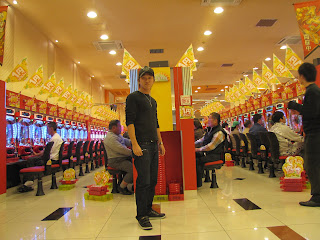I have never been one of those people with the ability to avoid my demons, therefore, it was only a matter of time until I found myself in of of Japan's countless Pachinko parlors. I didn't think that drinking a beer, smoking a cigarette, and gambling would allow me to fit right in on a Sunday afternoon in Japan, but somehow, it did. Luckily I had my Japanese buddy Takuya with me or I would have been both confused and very bored (its not the most intense game to say the least).
There are two aspects of this shockingly popular pastime, that stick out to me, one being very different then the norm and one being quite typical.
The first, after being slightly accustomed to Japanese culture, basically punches you in the head as soon as the doors open. Japan is a country of very quiet people (for the most part). You can be shoulder to shoulder on a train and hear a conversation at the other end of the cart. Well, although nobody is talking in Pachinko (because its too damn loud), it not only by far the loudest place I have been in Japan, but the loudest place I have been anywhere that lacks rock bands and race cars. The sound of little metallic balls bouncing around and high pitch anime soundtracks echoed through my brain for a while after leaving.
When we decide to leave we go through the process of turning our marbles into money. I get my receipt from the first guy and bring it to the second guy. As I'm waiting in line my buddy says to me, "Hey you know that gambling is illegal in Japan right?" Interesting. Then why the hell did I just twist a nob for an hour watching balls bounce around? Was that supposed to be fun? Am I about to win a bag of cookies or something? Well, technically I did win a bag of cookies and some other small weird thing. Which I had to bring to the third guy, conveniently situated right outside the front door. I stuck my small weird thing through a tiny hole and then bam, out popped some cash. This, to me, is another example of how Japan has all of these rules and laws but yet the majority of them are ignored or just not inforced. I have realized that often times, there is no need to enforce these rules, because for the most part, people just don't break the rules simple because they are not supposed too. Pachinko is an example of a simple loophole in the system can result in a huge industry found basically everywhere you go in Japan. Macking the system is not breaking the rules. Smart people.




